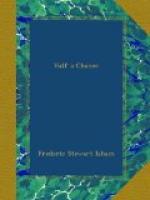Did she note the strangeness of the look she seemed to have surprised on his face? Her own glance grew on the instant slightly puzzled, showed a passing constraint; then her manner became light again. “No. Especially as—You are leaving to-morrow, I believe?”
“Yes.” He tried to speak in conventional tones; but his gaze swerved from the graceful figure with its dim, white lines that changed and fluttered in the faint breath of air, stealing so gently by them and away. “My time is almost up; the allotted period of my brief Elysium!” he half-laughed.
“And yet it was rather hard to get you here, wasn’t it? You remember you quite scorned our first invitation,” gaily.
“Scorned?” In the semi-darkness he could only divine her features. “That is hardly the word.”
“Isn’t it? Well, then, you had business more important,” she laughed.
“Not more important,—imperative.” Was his voice, beneath an assumption of carelessness, just a shade uncertain? again it became conventional. “I—have enjoyed myself immensely.”
“Have you?” She glanced at him; a flicker of light touched the strong face. “So good of you to say so! I believe that answer is the proper formula. Invented by our ancestors,” lightly, “and handed down!”
He did not at once reply; again she caught a suggestion of that searching look she had noted before, and after a moment the girl turned; walking to a rose-bush that partly screened one end of the balcony, she bent over the flowers. “Of course I might use my influence with my aunt to have the time allotted you, as you put it, extended. Especially as you are so appreciative!” she laughed. “Until after the children’s fete, for example! What do you say? Shall I plead for you until then? If you will promise to make yourself very useful!”
“I—you are very good—but—”
“Don’t!” She spread out her hands. “Forgive me for presuming to think that Strathorn House and its poor attractions could longer keep Mr. John Steele from smoky London-town and the drone of its courts!”
“It is not that”—he began, stopped.
“Go; we abandon you to your fate.” It may be that he had made her feel she had been somewhat over gracious, as he had, once or twice before,—that night at the opera, when they had first met; afterward on taking leave of him on the return from Hyde Park. But she only laughed again, perhaps a little constrainedly this time. “You will miss the revival of a few old rural pastimes!” she went on. “That sounds quite trivial to you though, does it not? Several of our present guests will stay, however; others are coming; Lord Ronsdale,” lightly, “has even begged to remain; we shall probably lead the old country-dance.”
“Lord Ronsdale!—You!”—The flame again played in the dark eyes, more strongly now, no longer to be suppressed.
“Mr. Steele!” Her brows arched in sudden surprise; she drew back a little.




